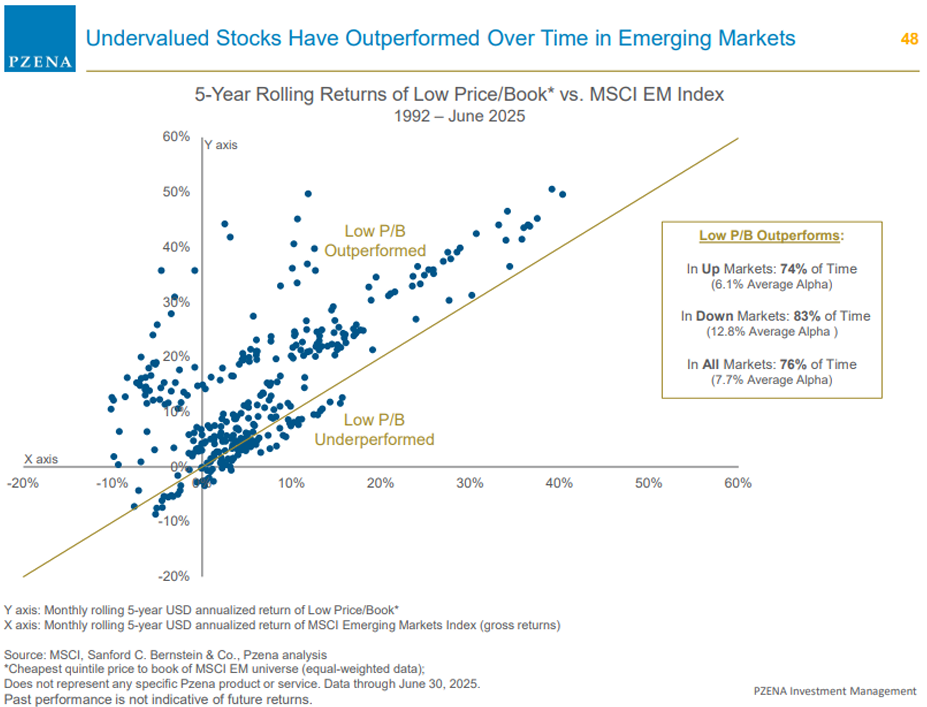4 reasons value investing works better in emerging markets
Emerging markets have long been defined by volatility, but for disciplined investors, that volatility is not a risk to avoid, but a catalyst for opportunity.
In a world awash with crowded trades and momentum-driven narratives, value investors are increasingly turning their attention to markets where dispersion is greatest and mispricing is most extreme.
While headlines often focus on short-term macro uncertainty, beneath the surface, a powerful shift is underway: capital is beginning to revisit intrinsic value over sentiment.
Few understand this dynamic better than Rakesh Bordia, co-portfolio manager at Pzena Investment Management, who has spent nearly two decades applying a disciplined value philosophy across emerging markets and international strategies.
With a background spanning software engineering, technology, and strategic consulting, Bordia brings a uniquely analytical and research-driven lens to market dislocation, seeking out companies trading at meaningful discounts to their long-term earnings power.
His approach is rooted in fundamental analysis and a belief that volatility is not a threat to be avoided, but a catalyst for opportunity when paired with patience and conviction.
In this week’s Q&A, Bordia reveals where he's currently finding the most compelling opportunities, why today's least-loved sectors may hold the strongest forward returns, and how investors can use volatility as a strategic advantage rather than a psychological hurdle.

What’s your most recent investment and why?
We recently purchased Arcos Dorados (NYSE: ARCO), the largest global franchisee of McDonald’s in Latin America, with Brazil, Mexico, and Argentina as its core markets.
The company benefits from deep regional expertise and operational excellence, which enable a low-cost structure and efficient execution.
Additionally, its store footprint is strategically skewed toward free-standing locations, a significant advantage, as consumer preferences shift increasingly toward delivery and drive-through over in-store dining.
A major overhang related to its franchise agreement was resolved last year, improving clarity for investors.
While elevated beef prices and macroeconomic softness present near-term challenges, we believe these are likely transitory and present an opportunity to invest in Arcos at a very compelling valuation.
Which investment did you add to your watchlist this week?
Recently, the luxury goods sector has come under pressure, largely due to the broader economic slowdown in China, a key growth engine for many global luxury brands. This dislocation has created a fertile environment for potential opportunities, as market sentiment has become increasingly disconnected from intrinsic value.
Notably, companies such as Swatch (SWX: UHR), Burberry (LON: BRBY), and Kering (EPA: KER) have experienced meaningful share price declines, driven by their significant exposure to Chinese consumers.
Beyond industry-wide challenges, many of these companies also have notable self-help opportunities. Swatch could see meaningful earnings upside if management rationalises its watchmaking capacity to better align with current demand. Burberry and Kering are both implementing management initiatives to address previous missteps that led to market share loss.
At Pzena, we employ a disciplined, bottom-up fundamental investment approach focused on identifying deeply undervalued companies with strong long-term business fundamentals. These types of opportunities, which combine self-help opportunities with attractive valuations, are central to our investment process.
What is the most recent investment you have trimmed or sold, and what drove this decision?
We recently sold United Integrated Services (TPE: 2404), the world’s leading provider of cleanroom engineering and construction services for the semiconductor industry. A significant portion of UIS’s revenue is generated from its long-standing relationship with Taiwan Semiconductor Manufacturing Company (NYSE: TSM), the global leader in advanced chip fabrication.
As TSMC has continued to scale up its capital expenditures to meet growing, AI-driven demand for cutting-edge logic semiconductors, it has needed larger, more complex cleanroom facilities with increasingly stringent standards – precisely the type of projects in which UIS specialises.
As a result, UIS has benefited from robust growth in both revenue and order bookings over the past several quarters, directly driven by the expansion cycle in the semiconductor industry.
Given this strong momentum, UIS appreciated significantly, reflecting investor optimism. The company’s stock price reached fair value against our through-the-cycle normalised earnings estimate, resulting in our exiting the stock.
What’s your favourite chart or data point from this week?

As the chart above shows, valuation has historically been a strong indicator of long-term returns - particularly in EM.
At Pzena, we use deep research to identify those stocks with the highest alpha potential for our clients. We believe value investing works particularly well in EM for several reasons:
- Higher Volatility, Greater Opportunity: Emerging markets experience more volatility, but this offers outsized return potential for value investors due to mispriced assets and emotional investor behaviour.
- Misconceptions About Growth: Many investors wrongly equate economic growth (GDP) with equity returns, leading to disillusionment and mispricing when quick gains don’t materialise - creating fertile ground for disciplined value strategies.
- Complexity Creates Opportunity: Diverse political, legal, and economic environments across emerging markets lead to a wide range of investment outcomes and mispricings.
- Underexploited Market: Heavy reliance on macroeconomic or quantitative strategies leads to crowded trades and volatility, opening the door for fundamental, valuation-based investors to exploit dislocations.
What was your weekly high – a standout market moment or highlight?
The market has begun to recognise the earnings power of Alibaba (NYSE: BABA). We were initially attracted to the company for its strong e-commerce franchise undergoing a strategic turnaround, its dominant and rapidly growing cloud business with improving margin potential, and its ability to adjust its investments to enhance profitability. At the time, the stock traded at an exceptionally attractive valuation: just 6x enterprise value-to-free cash flow.
The market has now started to reflect these positives, particularly the progress in e-commerce and the acceleration of cloud growth driven by AI adoption, resulting in a sharp rise in the share price.
Alibaba is a prime example of our focus on identifying good businesses undergoing internal improvements before the market acknowledges them. This enables us to invest in high-quality businesses at compelling valuations, with strong conviction in their fundamental recovery – grounded in deep, bottom-up research.
What was your weekly low – a market disappointment or challenge?
At Pzena, we apply a long-term lens; however, short-term market movements do sometimes present us with opportunities.
Over the last couple of years, Brazilian equities have continued to reflect a negative outlook, largely driven by fears that President Lula could enact populist fiscal measures.
As a result, Brazilian equities are cheaper now than they were during the early months of the COVID-19 pandemic, as well as the 2014-2016 recession, with the forward price-to-earnings ratio for Brazilian equities fluctuating between 6x and 8x over the past three years.
This backdrop has provided an opportunity for Pzena to invest in several Brazilian stocks with valuations reflecting severe pessimism, devoid of fundamentals. Notable examples include Banco do Brasil (BVMF: BBAS3), Ambev (BVMF: ABEV3), and CMIG (BVMF: CMIG4).
What first drew you to markets or this sector and what continues to keep you inspired today?
It’s simple; I love the continuous learning and discovery that comes from digging into how the world and businesses work, especially alongside a team of incredibly smart and curious people.
One thing that’s particularly unique at Pzena is our practice of rotating global sector coverage every few years.
This not only brings fresh perspectives to our research and challenges our assumptions but also creates exciting opportunities for the investment team (including me) to dive into new industries and broaden our understanding of different business models.
For those of us who thrive on intellectual curiosity, it’s an ideal environment.
What’s one piece of advice you’d give to new investors?
I’ve noticed that newer investors can get overly influenced by short-term market fluctuations.
My advice would be not to overreact to market or stock price moves; quite often, there is an investment opportunity hidden in those fluctuations.
How do you unwind when you’re not thinking about the market?
I love running in Central Park on crisp mornings, and I enjoy occasionally playing poker with friends and family.
4 topics
3 stocks mentioned

